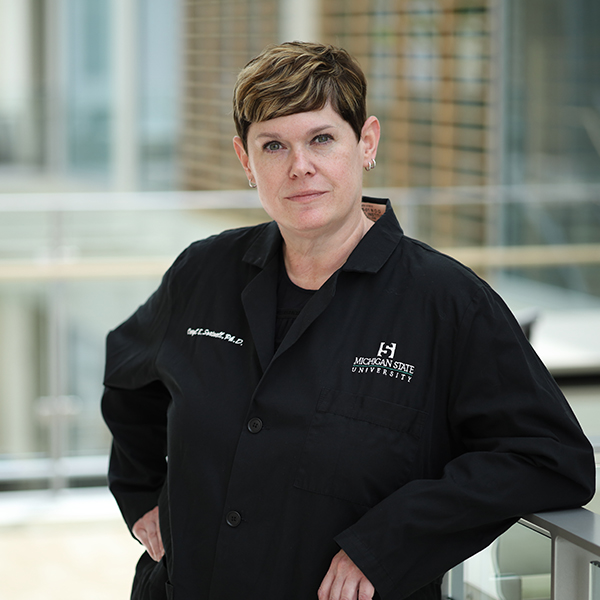Caryl E. Sortwell, PhD

- Professor of Translational Neuroscience
- Edwin A. Brophy Endowed Chair in Central Nervous System Disorders
- Department of Translational Neuroscience
- Michigan State University College of Human Medicine
- Teaching Faculty, MSU Neuroscience Program
- Grand Rapids Research Center
- 400 Monroe Ave NW, Grand Rapids, MI 49503
- Phone: 616.234.0959
- Fax: 616.234.0991
- caryl.sortwell@hc.msu.edu
Biography
Caryl Sortwell received her Bachelor’s degree in Psychology/Pre-medicine from the University of Illinois at Champaign-Urbana in 1987. She earned her PhD in Anatomy and Cell Biology/Neurobiology in 1994 from the University of Illinois at Chicago. Between 1994-1997 she received postdoctoral training at the Rosalind Franklin Medical School and Rush University Medical Center, before joining the Department of Neurological Sciences at Rush as an Assistant Professor in 1997, and ultimately as an Associate Professor in 2005. Later that same year she joined the Department of Neurology at the University of Cincinnati as an Associate Professor. In 2009 she helped to found the Department of Translational Neuroscience at Michigan State University College of Human Medicine Campus in Grand Rapids where she continues as Professor and Associate Chair. Sortwell is the Edwin A. Brophy Endowed Chair in Central Nervous System Disorders.
Education
| Institution | Field of Study | Degree Earned | Year |
|---|---|---|---|
| University of Illinois, Champaign, IL | Psychology | B.S. | 1987 |
| University of Illinois at Chicago, Chicago, IL | Anatomy & Cell Biology | Ph.D. | 1994 |
| Chicago Medical School, North Chicago, IL | Neuroscience | Fellow | 1994-1996 |
| Rush University Medical Center, Chicago, IL | Neuroscience | Fellow | 1996-1997 |
Research Interests
Dr. Sortwell’s research program focuses on therapeutic strategies for Parkinson’s disease (PD). Specifically, she studies the impact of alpha-synuclein pathology by investigating the synucleinopathy triggered by alpha-synuclein preformed fibrils. Additionally, using this model, she investigates the potential of novel disease-modifying treatment strategies. Another focus of her research program is to improve the efficacy of existing anti-parkinsonian treatments (pharmacotherapies, deep brain stimulation) using precision medicine approaches.Technical Expertise
- Immunohistochemistry, immunofluorescence, in situ hybridization
- Stereological analysis
- Stereotaxic surgery in rodents, including gene therapy approaches
- Synucleinopathy and neurotoxicant models of PD
- Rodent model of long-term deep brain stimulation
- Primary neuronal cell culture
- Protein Analysis: Western Blot and ELISA
- Droplet Digital PCR
- Genotyping of clinical PD samples

